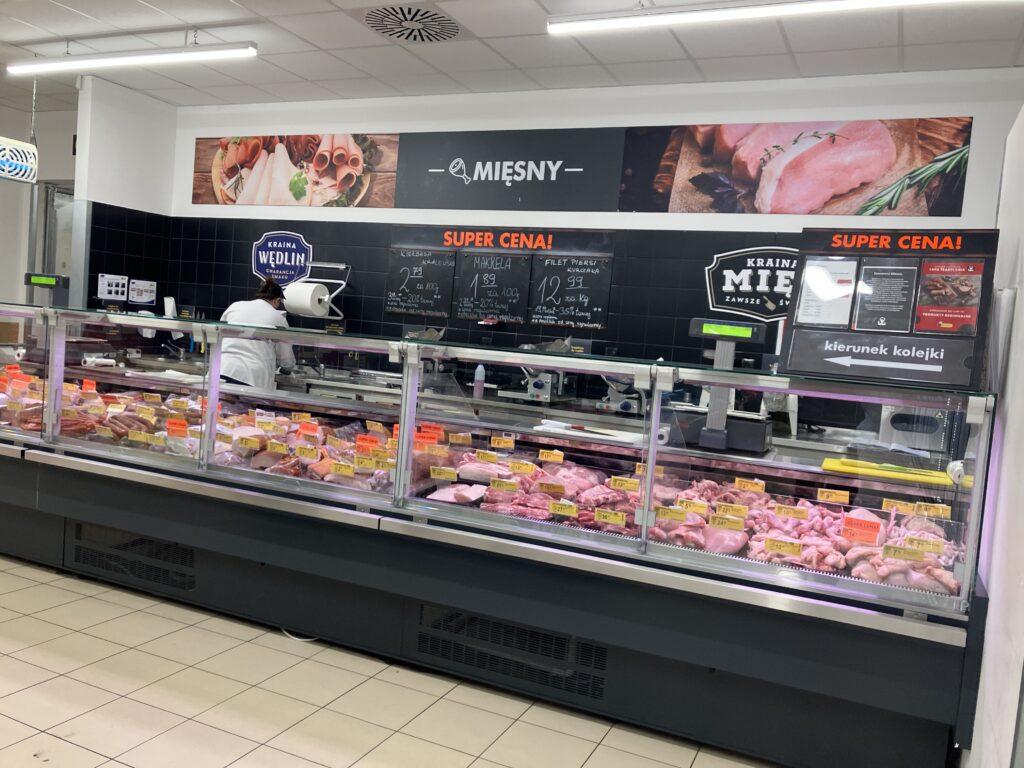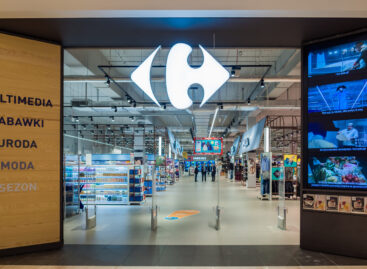Serviced counters help local proximity supermarkets rise in Central & Southeast Europe
Local proximity supermarkets increase their market share in Central & Southeastern Europe despite strong international competition. Especially in Poland and Romania the large gap between rural and urban areas provides the small-size formats with expansion opportunities. Serviced counters for fresh produce play a big role in winning the favor of the more traditionally oriented shoppers. Also discounters are upgrading their store concepts with counters to better meet local demand.

Biedronka operates serviced counters in 1120 stores across Poland
Local proximity supermarkets climb to top positions in national grocery rankings in Central & Southeastern Europe. Especially in Poland and Romania the small-area operators thrive despite the dominance of large international players. In these retail frameworks the strong traditional orientation of consumers allows local heroes to differentiate themselves from the standardized approach of international peers. One element that strengthens local anchoring are serviced counters for fresh produce.
According to World Bank statistics, Poland ranks 5th among all EU countries when it comes to the share of population living in rural areas. In 2022 the indicator stood at 40% of total population, while the EU average lay at 25%. Data from GfK Consumer Panel Services in Poland shows that the purchasing frequency in rural areas in the twelve months up to November 2023 was around 15% lower than that at national level. At the same time the basket size was 24.9% higher than the country’s average. Rural shoppers seem to follow the one-stop-shopping mission for the whole family much more than their urban counterparts.
The most prominent example for successfully adapting to this clientele is Polish local grocery hero Dino. In the past year the retailer could grow its revenue by 29.6% to 5.7 bn euro based on flexible exchange rates. With high double-digit growth rates over the past years Dino has advanced to the number 4 position in Poland’s national grocery ranking. Company data shows that the average annual revenue growth rate from 2019 to 2022 reached 24.1% on euro basis. Market leader Biedronka in the comparable period grew on average by 12.0% per year. Number 2, Lidl, reached a revenue growth in euro of 12.1% per year.
Dino seems to serve the rural shopper well. The retailer supports the one-stop-shopping mission with a full assortment of around 5,000 items – 94% of them branded and mostly from Polish suppliers – on compact, standardized sales areas of close to 400 sqm. At the same time Dino is mainly absent from large cities such as Warsaw, Cracow or Wrocław.
Instrumental in Dino’s success, other than a strong focus on Polish brands, are the serviced counters for fresh produce that every store features. Dino is supplied by the group’s own meat production arm Agro-Rydzyna, which according to data published by the Finance Ministry generated a net revenue of converted 512 million euros in 2022, translated to more than 9% of Dino’s retail sales (assuming margin neutrality). Also other Polish proximity supermarkets such as Stokrotka, Lewiatan or Delikatesy Centrum feature serviced counters as a standard.
Polish market leader Biedronka, who operates a large part of its store estate outside of big cities, has been rolling out traditional counters in its stores from end of 2019. As Weronika Gałka, project manager for serviced counters at the retailer informs, at the end of March Biedronka had installed counters in 1120 stores in its store estate of more than 3570 locations nationwide. Biedronka’s expertise in the fresh categories might also serve as competitive advantage for the upcoming market entry in Slovakia. 46% of the whole population of Poland’s southern neighbour lives in areas classified as rural – the highest percentage in all of Europe together with Romania.
Fresh ranges in service also are a standard concept at proximity operator and local hero Profi in Romania. Over the past five years the retailer has climbed from position 6 in the national grocery ranking to position 3 and generated a net revenue of 2.5 bn euros in 2022. The euro-based average annual growth rate from 2019 to 2022 reached 16.4%. Market leader Lidl in the comparable period grew by 22.9% annually, second in line Kaufland, by 9.1%.
Also Rewe Group’s Penny discounters in Romania are strengthening their local anchoring by rolling out counters. The retailer recently announced plans to increase the number of stores equipped with serviced counters from currently 200 to 375 stores by 2029. The approach, however, is slightly different to that of Dino, Biedronka or Profi. According to Penny, the traditional counters for fresh produce located in front of the cash line are operated by 18 independent, regional butcheries. Additionally, Penny operates 10 own butcheries, a legacy from the conversion of Penny XXL stores, a larger Penny concept piloted more than ten years ago. As the company announced, the implementation of butcheries offers more choice in the key categories meat and meat products and provides opportunities to offer products calibrated to local demand. Although with a number 6 position in the national grocery ranking in the shadows of the market leaders, Penny could grow its annual revenue on euro basis on average by 20.3% from 2019 to 2022. Only Lidl managed to advance slightly quicker with an annual growth rate of 22.9% in the same period.
Related news
Related news
József Viski: Adaptation and competitiveness are key for the horticultural sector
🎧 Hallgasd a cikket: Lejátszás Szünet Folytatás Leállítás Nyelv: Auto…
Read more >








